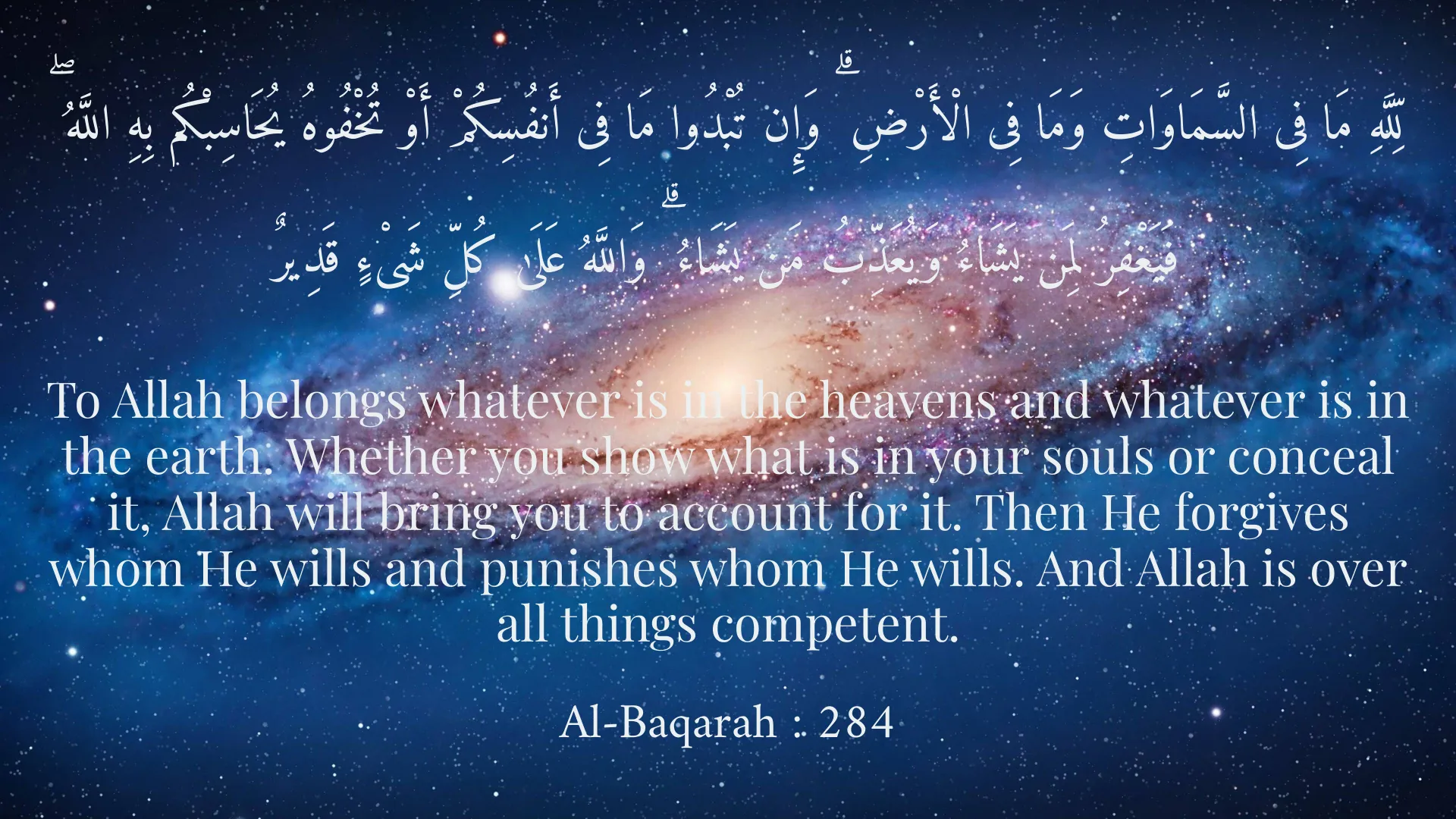Quranic Answer

In the profound teachings of the Holy Quran and the fundamental tenets of Islamic belief, it is unequivocally stated that Almighty God is not only aware of our outward actions but is also fully cognizant of all hidden intentions, inner thoughts, and what transpires in the depths of hearts and souls. This truth is one of the core pillars of understanding God and appreciating His justice and wisdom. God is 'Al-Aleem' (The All-Knowing) and 'Al-Khabir' (The All-Aware), meaning that absolutely nothing, whether manifest or concealed, lies outside His boundless knowledge. His knowledge encompasses all beings, times, places, and even the slightest mental whispers and the innermost intentions of human beings. The Holy Quran addresses this matter in numerous verses. For instance, in Surah Al-Baqarah, verse 284, Almighty God states: “To Allah belongs whatever is in the heavens and whatever is in the earth. Whether you show what is in your souls or conceal it, Allah will bring you to account for it. Then He forgives whom He wills and punishes whom He wills. And Allah is over all things competent.” This verse explicitly declares that whether we disclose what is within ourselves or conceal it, Allah will hold us accountable for it. This signifies that intention and what transpires within the soul are as, or even more, important than the outward action. Furthermore, in Surah Aal-Imran, verse 29, we read: “Say, 'Whether you conceal what is in your breasts or disclose it, Allah knows it. And He knows what is in the heavens and what is in the earth. And Allah is over all things competent.'” This verse further emphasizes that what is hidden in the breasts or revealed is all within divine knowledge. These verses teach us that merely performing an outward action is insufficient; rather, it is the spirit and intention governing that action that imbue it with true value. A good deed, if not performed with a pure intention for the sake of God, may be worthless in His sight, whereas a pure intention to perform a good deed, even if it cannot be materialized due to external obstacles, can still earn reward. This emphasis on intention highlights the concept of 'Ikhlas' (sincerity) as critically important in Islam. Ikhlas means performing an action solely for the pleasure of God, avoiding any form of show-off or hypocrisy (Riya'). Someone who performs an action to gain people's praise (Riya'), although outwardly appearing to have done good, is considered spiritually worthless because their intention was not for God. Conversely, an individual who performs an action secretly and with pure intention will receive immense reward from God. This is also reflected in Surah Al-Bayyinah, verse 5: “And they were not commanded except to worship Allah, [being] sincere to Him in religion, inclining to truth, and to establish prayer and to give zakah. And that is the correct religion.” This verse indicates that the primary purpose of creation and religious commandments is the sincere worship of God. Knowing that God is aware of intentions profoundly impacts human self-purification and moral development. This belief compels believers not only to refine their outward conduct but also to constantly purify their inner selves and intentions. It prevents hypocrisy and duplicity, guiding individuals towards genuine honesty with themselves and with God. This is why, in Islam, the importance of intention is such that sometimes the intention behind an action is considered more significant than the action itself, for it is the intention that directs and gives value to deeds. Ultimately, this understanding that God scrutinizes our hidden intentions provides us with solace and hope. For we know that even when our actions may appear incomplete or remain unrealized, if our intention is pure and sincere, God is aware of it and will not let its reward be lost. This attribute of divine knowledge ensures His justice is absolute and flawless; His judgment is based not on deceptive appearances but on the existential truth and inner reality of deeds.
Related Verses
لِّلَّهِ مَا فِی السَّمَاوَاتِ وَمَا فِی الْأَرْضِ ۗ وَإِن تُبْدُوا مَا فِی أَنفُسِکُمْ أَوْ تُخْفُوهُ یُحَاسِبْکُم بِهِ اللَّهُ ۖ فَیَغْفِرُ لِمَن یَشَاءُ وَیُعَذِّبُ مَن یَشَاءُ ۗ وَاللَّهُ عَلَىٰ کُلِّ شَیْءٍ قَدِیرٌ
To Allah belongs whatever is in the heavens and whatever is in the earth. Whether you show what is in your souls or conceal it, Allah will bring you to account for it. Then He forgives whom He wills and punishes whom He wills. And Allah is over all things competent.
Al-Baqarah : 284
قُلْ إِن تُخْفُوا مَا فِی صُدُورِکُمْ أَوْ تُبْدُوهُ یَعْلَمْهُ اللَّهُ ۗ وَیَعْلَمُ مَا فِی السَّمَاوَاتِ وَمَا فِی الْأَرْضِ ۗ وَاللَّهُ عَلَىٰ کُلِّ شَیْءٍ قَدِیرٌ
Say, 'Whether you conceal what is in your breasts or disclose it, Allah knows it. And He knows what is in the heavens and what is in the earth. And Allah is over all things competent.'
Al-Imran : 29
یَعْلَمُ مَا فِی السَّمَاوَاتِ وَالْأَرْضِ وَیَعْلَمُ مَا تُسِرُّونَ وَمَا تُعْلِنُونَ ۚ وَاللَّهُ عَلِیمٌ بِذَاتِ الصُّدُورِ
He knows what is in the heavens and earth and knows what you conceal and what you declare. And Allah is Knowing of that within the breasts.
At-Taghabun : 4
Short Story
It is narrated that one day, a boastful and wealthy man built a magnificent mosque and spoke of his good deed in every street and alley, seeking people's praise. In the same city lived an old woman, very poor, who secretly bought a thread and needle from her meager earnings. In a hidden corner, she mended a torn garment for an orphan child and never uttered a word about it. That night, she dreamed a voice saying: 'That mosque, with all its grandeur, only gained a name on earth and its true reward was little. But the thread and needle of that woman, used with pure intention and without any expectation, for Our pleasure, were recorded in the heavens and elevated her. We look not at the volume of the deed, but at the sincerity of the intention.'